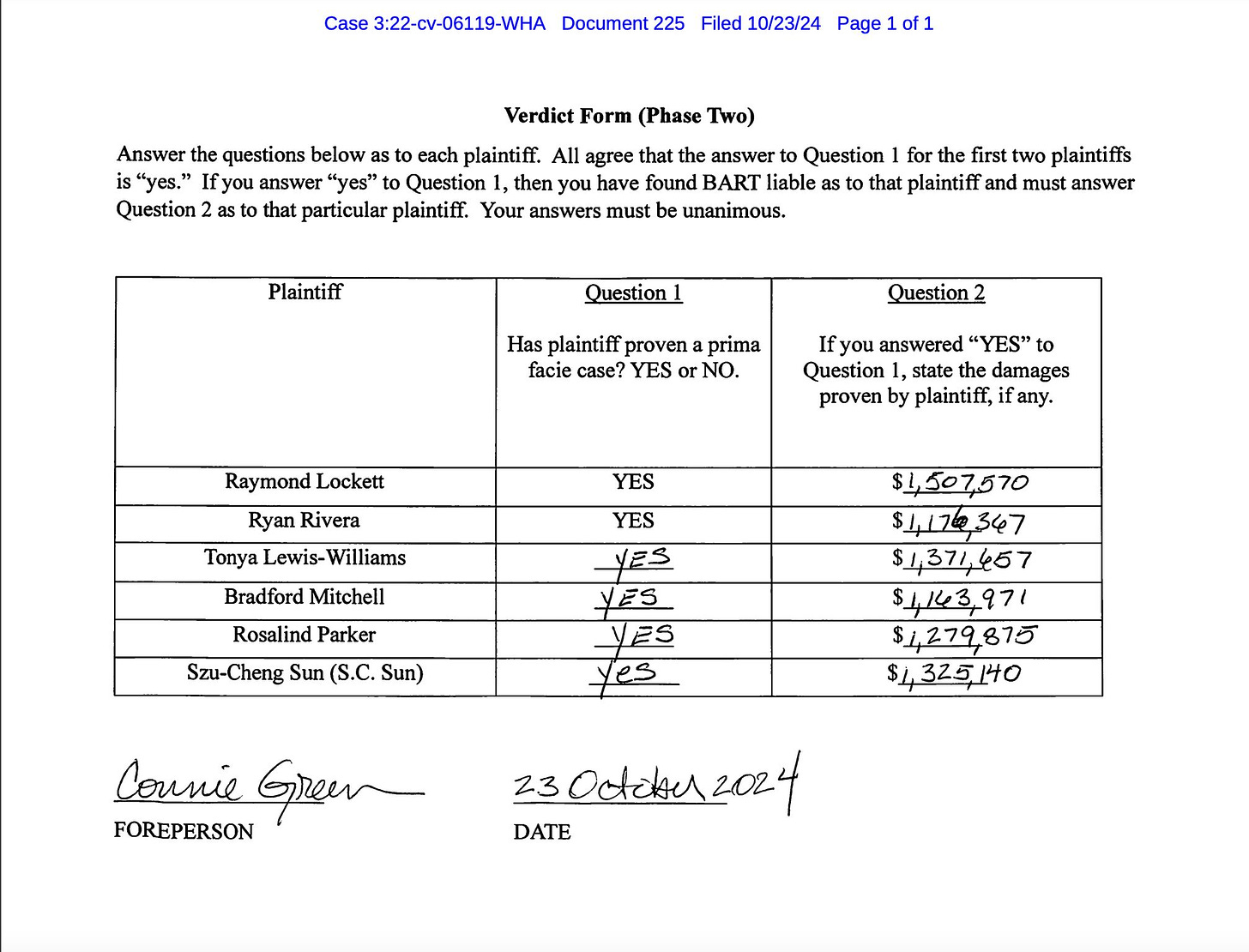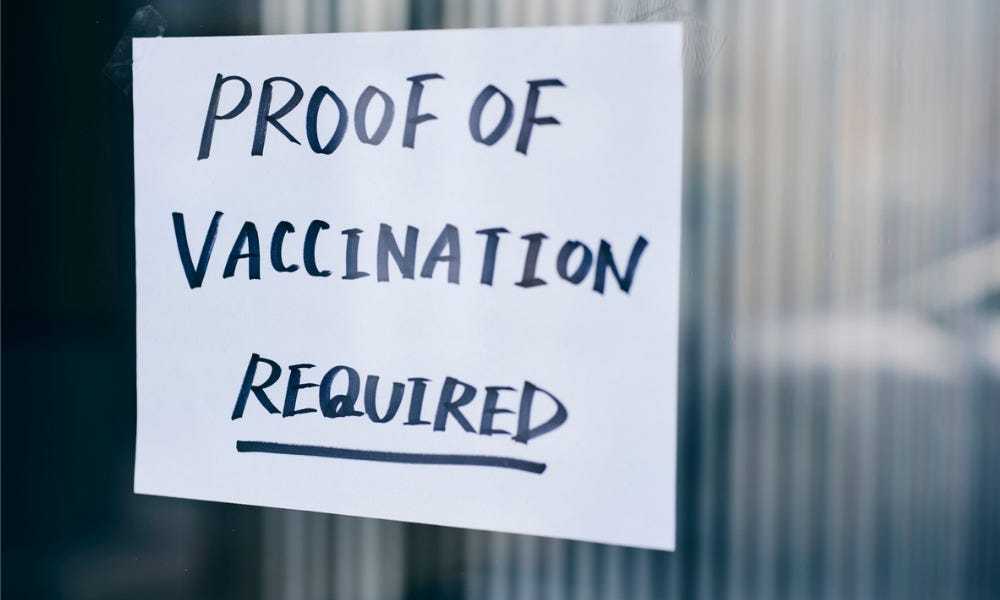JUST IN - San Francisco Bay Area Rapid Transit District (BART) Must Pay $7.8 Million to 6 Workers Fired for Refusing COVID-19 Vaccines.
It's about time government agencies are held accountable.
A jury awarded over $1 million to each of six former BART employees who were fired for seeking religious exemptions from the COVID-19 vaccine mandate. The court rejected BART's claim of undue hardship, ruling the firings violated their religious rights. This landmark decision comes after nearly three years of struggle.
The jury in an earlier phase of the trial had rejected BART’s primary defense that the public transit agency couldn’t reasonably accommodate the employees seeking religious exemptions without undue hardship.
The case is one of hundreds of workers around the country arguing their employers improperly denied their faith-based bids for exemption from vaccine mandates implemented in the midst of the pandemic.
Pacific Justice Institute. The workers’ attorney Kevin Snider of the Pacific Justice Institute said in a statement that “the rail employees chose to lose their livelihood rather than deny their faith,” which shows the sincerity of their convictions.
“After nearly three years of struggle, these essential workers feel they were heard and understood by the jury and are overjoyed and relieved by the verdict,” he said.
BART declined to comment on the verdict. The agency filed a motion for judgment as a matter of law during the trial, which Judge William Alsup said would be argued in December.
BART, which has over 3,000 employees and operates throughout the nine-county San Francisco Bay Area, was sued by the former employees in 2022.
The workers claimed that BART failed to accommodate their requests for religious exemption from the vaccine requirement that was imposed by the transit agency’s board of directors in the fall of 2021, costing them their jobs. The workers cited a variety of beliefs to justify their exemption, including Catholicism and Islam.
BART argued that its vaccine policy was a good-faith implementation of public health guidance at the time and that accommodating unvaccinated workers would pose an increased health risk and an undue hardship on the agency.
Alsup earlier this year declined to certify the case as a class action, instead requiring each worker to show how BART violated their religious rights.
He declared a partial mistrial in July when a previous jury was deadlocked on the questions of whether BART would face an undue hardship by accommodating the unvaccinated employees.
The potential lawsuits arising from businesses firing unvaccinated employees can vary widely based on several factors, including jurisdiction, company policies, and the specific circumstances of each case. Here are some potential legal avenues that could be pursued:
1. Discrimination Claims:
**Disability Discrimination**: Employees may claim that their termination violates the Americans with Disabilities Act (ADA) if they have a medical condition preventing vaccination.
**Religious Discrimination**: Employees could argue that their religious beliefs exempt them from vaccination mandates, potentially violating Title VII of the Civil Rights Act.
2. **Wrongful Termination**:
Employees may argue that their firing was unjustified or violated company policy, particularly if they were not given reasonable accommodations.
5. **Public Policy Claims**:
Some jurisdictions recognize claims based on public policy, arguing that firing an employee for refusing to follow a mandate that contradicts public interest is unlawful.
### Factors Influencing Lawsuits:
**State Laws**: Different states have varying laws regarding employment, vaccination mandates, and employee rights.
**Vaccine Mandate Policies**: The nature of the mandate (e.g., government-issued vs. company policy) can influence the legality of firings.
Documentation and Communication: How well businesses document their vaccination policies and communicate with employees can play a crucial role in legal outcomes.
### Conclusion
Businesses considering vaccination mandates should consult legal experts to navigate the complexities of employment law and minimize the risk of lawsuits. Employees facing termination under such mandates may want to seek legal advice to explore their rights and options. The case is Lewis-Williams v. San Francisco Bay Area Rapid Transit District, N.D. Cal., No. 3:22-cv-06119, 10/23/24.
The precedent set:
This case will be a precedent-setting case for other employers if their employees claim a religious exemption.
In the case of public schools, there are several requirements:
The legality of school policies regarding COVID-19 vaccination varies by jurisdiction and is influenced by several factors. Here are some key points to consider:
### Legal Framework
1. **State Laws**:
Many states have laws that allow schools to require vaccinations for students, which can include COVID-19 vaccines. These laws often apply to specific vaccinations required for school attendance.
2. **Emergency Powers**:
During public health emergencies, state and local governments may have the authority to implement health measures, including vaccination mandates, to protect public health.
3. **Federal Guidelines**:
The Centers for Disease Control and Prevention (CDC) and the U.S. Department of Education have issued guidelines that schools can follow, but they do not mandate vaccinations.
### Exemptions
1. **Medical Exemptions**:
Many states allow for medical exemptions if a student has a health condition that contraindicates vaccination.
2. **Religious Exemptions**:
Some states permit religious exemptions, allowing parents to refuse vaccinations based on their religious beliefs.
3. **Philosophical Exemptions**:
A few states also allow philosophical or personal belief exemptions, though these are less common.
### Court Challenges
**Legal Challenges**: Some school vaccination mandates have faced legal challenges with courts evaluating the balance between public health interests and individual rights. Outcomes can vary based on state laws and the specific circumstances of each case.
### Conclusion
Overall, while many school policies regarding COVID-19 vaccinations are legal, their enforceability and acceptance can depend on state laws, available exemptions, and ongoing legal challenges. Schools and parents should stay informed about local regulations and legal precedents.



